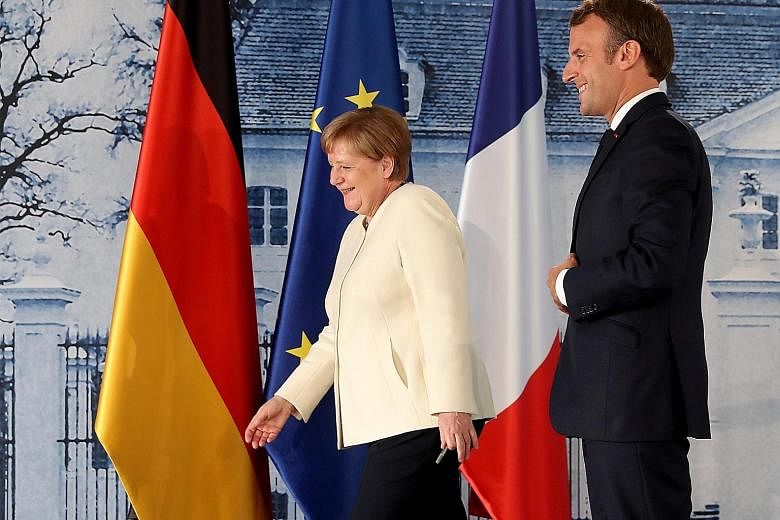FRANKFURT AM MAIN • Germany took over the European Union's six-month presidency yesterday, with outgoing Chancellor Angela Merkel staking her legacy on a massive economic recovery plan to help the bloc cope with the coronavirus fallout.
Dr Merkel's last major role on the international stage comes as the 27-member club faces its deepest recession since World War II, triggered by a pandemic that has killed more than 500,000 people globally.
The crisis has galvanised Europe's most powerful leader who, with just over a year left in her final term, has ditched her usual wait-and-see approach to call for "extraordinary measures" to weather the storm.
"Europe's future is our future," Dr Merkel said on Monday as she stood beside French President Emmanuel Macron to push for a €750 billion (S$1.2 trillion) coronavirus recovery fund.
The proposed fund would controversially be financed through shared EU borrowing and marks a stunning U-turn for Germany after years of opposition to debt pooling.
The EU's rotating presidency is Dr Merkel's "last chance" to make her mark as one of Europe's great leaders, Der Spiegel weekly wrote, adding that it was time for Germany to shoulder more responsibility as the bloc's biggest nation and top economy.
"For years the Chancellor put off dealing with the chronic problems of the EU and the euro. Now, towards the end of her political career, she has the opportunity to make up for past mistakes," Der Spiegel wrote.
There will be no shortage of challenges to tackle in the months ahead.
Post-Brexit negotiations, a more assertive China, rocky transatlantic ties, climate change and the conflicts in Libya and Syria will all be jostling for attention, even if the pandemic promises to dominate the agenda.
Germany kicked off its EU custodianship by projecting the words "Together for Europe's recovery" onto Berlin's iconic Brandenburg Gate late on Tuesday.
After 15 years in office, Dr Merkel is the bloc's longest-serving leader and held the EU presidency once before, in 2007.
A first major test will come at an EU summit from July 17 to 18, where Dr Merkel hopes leaders will reach an agreement on the €750 billion rescue fund put forward by European Commission President Ursula von der Leyen - Dr Merkel's former defence minister.
The money is expected to come mainly in the form of grants for countries hardest hit by the pandemic, such as debt-laden Italy and Spain.
But so-called frugal nations want to rein in the spending and are insisting on loans rather than grants.
Dr Merkel has urged holdout nations to "engage in an extraordinary act of solidarity", warning that an uneven recovery could undermine the EU single market and end up harming stronger economies too.
"We hope we can find a solution, even if the road is still long," Dr Merkel said at the press conference alongside Mr Macron.
The fund is based on an idea unveiled by the French-German duo in May, in which the European Commission would raise money on the financial markets to help pay for the post-pandemic recovery in poorer member states.
If accepted, the rescue fund would be a milestone for EU unity.
It would also be a big win for Berlin, and could ease some of the lingering resentment from the euro-zone debt crisis a decade ago when Dr Merkel's government insisted on harsh austerity for struggling nations like Greece.
Another contentious issue that could define Germany's EU presidency is Brexit.
After weeks of a standstill, Britain and the EU have resumed negotiations about the country's divorce deal with the bloc - which could still result in a hard Brexit at the end of the year.
In an interview with several newspapers last week, Dr Merkel warned that Britain would "have to live with the consequences" of having weaker economic ties with the EU.
AGENCE FRANCE-PRESSE

